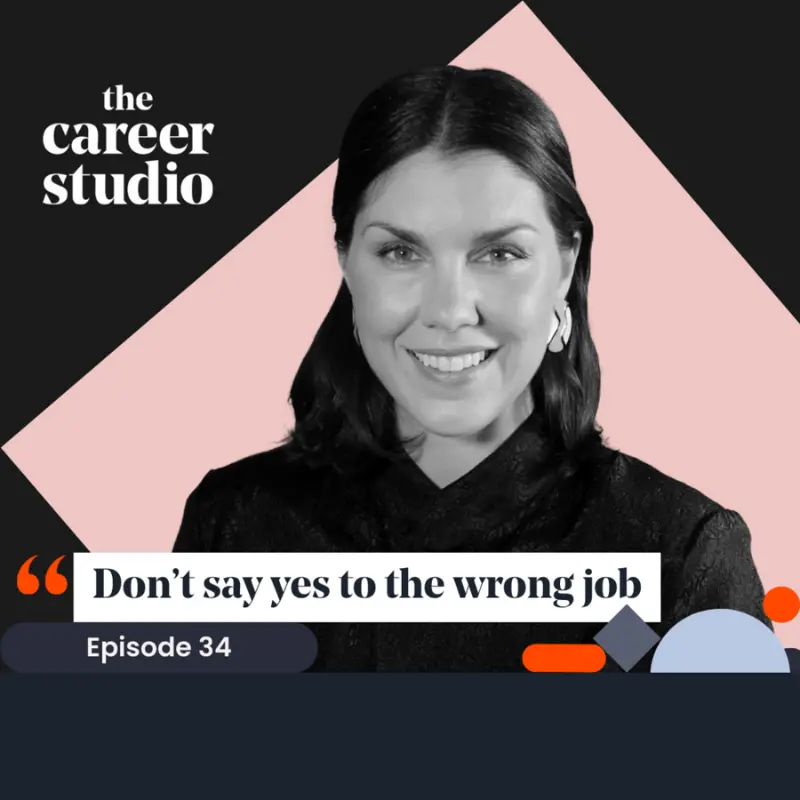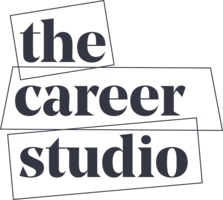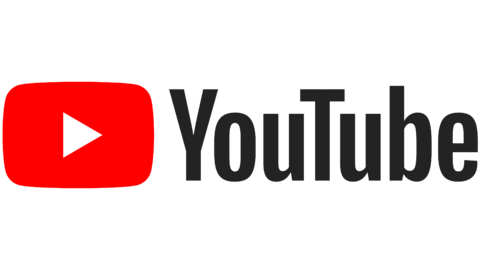Don't say yes to the wrong job

Are you worried that you’ll say yes to the wrong job? This is a common concern when we feel lost and stuck professionally. This can happen for three main reasons:
- You’re scattered - you don’t have a solid foundation based on the levers of career fulfillment to generate your hypotheses and assess opportunities.
- You’re rushing - you’re so desperate to get out of your current environment that you grab at anything that’s different instead of what’s right.
- You’re people pleasing - you get swept up in other people’s enthusiasm for you or their hard-sell on on opportunity and end up accepting a role that isn’t a good fit.
In this bonus episode I dive into these three areas in detail and discuss what to focus on instead to avoid these common pitfalls.
Are you ready to create an energizing career you love?
You can create a career that is simply an extension of who you are and how you want to live your life. If this sounds like what you’re after then schedule a consultation. We'll get to the bottom of what's going on for you. And exactly where you need to focus to bring your career and life into alignment. It's free!
For more from The Career Studio
Transcript
Welcome to the career studio podcast, where we boil down the noise and focus on the core concepts, essential for building an energizing career you love. One that is simply an extension of who you are and how you wanna live your life. Anyone can do it. It's just a matter of knowing what to focus on.
Hi guys.
Welcome to one of the bonus episodes of my podcast that I am doing this month to celebrate the launch of my group program in case you missed the last episode. And I also think I, maybe could have explained the group better. You know, the group has been a long time coming for me. I've only been working with people one on one and I've really been keen to bring this work to more people.
And the group is for anyone who feels like work isn't working and you aren't sure how to fix it. And you really want to create a career that feels like an extension of who you are and how you want to live your life, right? Where you get to show up and be you. Every day, and you want to do that work within the supportive container of a group.
The reason I really love a group is because in a group, you're really going to 10X your insights because you get coached, but also you see other people get coached. Every time I'm in a group container, I learn so much from the people that I'm in that container with. And then I also 10X my own momentum because I'm seeing other people take action and unblock themselves.
I'm seeing how they move forward in a way I might have not thought of. It holds me accountable to continue to take action. So my momentum increases. And in this group, you're going to 10X your connections, right? And opportunities because you're going to be in this container with other ambitious and focused people like yourself, who are all equally focused on creating energizing careers they love, but everyone else is going to have a different network than you.
Right. And so then everyone will be able to work with each other to introduce each other where appropriate and when appropriate to relevant people. So I'm super excited about the dynamics and what I think will be possible to take this work and put it in the setting of a group. So you can find out more by going to the website, www.thecareer.studio/group and applications will open on April 2nd, but if your name is on the waitlist, you will get the application a day early on April 1st. And if you're super interested in this, I definitely recommend getting on the waitlist. So you get that early application email, because spots in the group are limited.
This is a very selective and bespoke group that I'm really curating to make sure that the dynamics and the engagement is what I want it to be. And spots in the group are going to be filled on a rolling basis. So get your name on the waitlist. If this sounds interesting to you or tell other people in your life who you think this might be relevant for the group and you can point them to the website.
Okay. So super excited about that. And today, what I wanted to talk about is saying yes to the wrong job. And this kind of comes in two forms. I think a lot of people say yes to the wrong job for a number of reasons, or people are worried that they're going to say yes to the wrong job. So either way, I wanted to outline why I think this happens.
Right? Why people say yes to the wrong job? So you can either understand what you did wrong or, you know, where you might have taken a misstep, or you can avoid doing that in the present. Okay? So I'm going to outline why people do this, the different reasons I see, and then basically how you'd want to address that, what you would want to do instead to avoid it.
Okay. So there's kind of three areas I'm going to take you through, and that will be the episode. Okay. So the first reason I see that people say yes to the wrong job is that they are very scattered. So they don't have clarity about what they actually want. They kind of have hypotheses, but those hypotheses aren't built off of a strong foundation.
Maybe you came up with them. just randomly, or maybe those hypotheses are driven by limiting beliefs. Right. You think these are the ideas I have for my career and, and those ideas are created from a place of lack or thinking you have to do a certain thing to be successful. And I'm going to go very much into that topic next week in another bonus episode.
But the point here is that you're very scattered. There's not a lot of focus in terms of what would be the right thing and why. And combined with this, people can get in their head rationalizing, right? So. It's very easy to talk yourself into any one path, right? You know, you can make a case for anything, right?
That's what the debate team is for, right? Just like debating both sides of an argument. You can do that. You can always find the reasons why something would work and something wouldn't work. And when you're looking at a bunch of things, if you're only in your head, rationalizing, it's very hard to know what's right, right?
So the problem is here that there hasn't been a structured, intentional way that is connected to who you are to make a decision about what would be good options for you in terms of restructuring your career. Okay, so it's really about being scattered, about being overly in your head, about not being connected to yourself.
And this is also because people don't necessarily know what to pay attention to in order to create a career that feels good. Right. If I want to feel excited about my job, what do I need to pay attention to? What do I need to ignore? What are actually the levers that I need to pull and pay attention to and be scanning for as I'm thinking about my next step?
Right. And that could be, you know, changing jobs, changing careers, or just simply restructuring where you are, just even knowing what to focus on. This is the issue. It's not always about wholesale change. Sometimes it's just about iterating. Where you are. Okay, so this is basically exactly what I am talking about and going through in my; Clarify Your North Star workshop, which is part of my whole month of extra content in the lead up to the group application opening.
And the; Clarify Your North star workshop is on April 2nd, the day that the group opens. And so this is my proprietary tool on exactly what to focus on and what to ignore and how to think about what is important in order to create an energizing career you love. It is the structure that I take all of my clients through to help develop their map, their compass.
And it's something I haven't shared with the general public in this way before. I'm going to talk about this stuff in my work, but I'm sharing more detail, more of the stimulus questions that I take people through to really get at what would be a career that's energizing for me. Okay. So there's a lot of structure.
There's a lot of intentionality that I will share with you in the workshop. So if you feel really scattered, if you don't feel a lot of conviction around the paths in front of you, if you're worried, like, Oh gosh, if I say yes to this, I don't know if that's going to be right for me or not. I don't know if I'll be happy in that space.
Well, then you'll definitely want to join the workshop. And you can go and register for that workshop by going to www.thecareer.studio/northstarworkshop. Okay. This is part of the issue is that people don't know what to focus on. They're really scattered. The ideas they have don't come from a place of connectedness and knowing what is the recipe for being energized at work.
Okay. And that is what the workshop is about okay. So, you know, what people tend to do is just dive into action. Maybe they do something that's close to what they've done before. They just pick what they're already doing, or they pick something that they know people in their network have done. You know, this is how they develop their hypotheses.
I mean, this is why so many people end up in the wrong job out of college because they just choose the career path that their parents did or that was recruiting on campus. It's a very common and understandable decision at the time, but it's not factoring in the actual important things to focus on, which is what I'm going through in the workshop.
Okay, so that's problem one. That's why people say yes to the wrong job. They don't know what to focus on. They're super scattered and their decisions aren't grounded in who they are. Problem two. The other reason, second reason people say yes to the wrong job is people get desperate to get out of their current environment, right?
They start rushing to make a change. And this is because, you know, whatever is happening in the environment, people get fed up with and they feel so unhappy with where they are, then just becomes about getting out. Like, I just have to get out of here. They think that changing their environment will change how they feel.
And certainly so much of my work is about being intentional with your career and really choosing a path that's right for you. At the same time, what's a really important skill to build is learning how to create emotional calm and peace where you are, regardless of the circumstances, right? Because when we think, Oh, I just need to change my job.
So I feel better. Well, then we rush and we just choose something else. That's not our job. And we're not being intentional about the choices we make, and then you're going to end up in an environment that still isn't good, right? It still isn't right because you haven't been intentional about it. And now you're going to be in a completely new environment and it's not going to feel good.
And after, I don't know, three months, you're going to realize, wait, maybe this was a mistake. Now you're going to have to again look for another job, but you're potentially in an environment that is less comfortable because it's less familiar or potentially even worse. I mean, I've done this.
I once rushed to get out of a job. And I put myself in the worst six months of my career. I was working with an incredibly toxic boss who made me cry all the time. And that was, you know, way worse than the environment I rushed to get out of. I often call this in my content, rushing roulette, because when you're rushing, it's just random, you know, it's really high stakes.
If you're just randomly choosing whatever you can grab, that's different from where you are. Okay, so really what's important here is that you make your current environment as palatable as possible. You make it work for you by managing your mindset about, and this is really a skill people have to build and understand is learning how to create feelings of emotional peace or detachment.
Regardless of what's going on around them and like learning that skill that you can take with you into whatever environment you're going into is really important in general, but in the interim, that helps make the day to day less emotionally upsetting. Equally, it could be just restructuring it, right?
Maybe you'd talk to your boss, you want to get off of a project, do a different project, and that would make it more interesting for you or, or less stressful or. Maybe it's about setting boundaries. Sometimes people haven't developed the skill of saying no and setting boundaries and creating space for their personal life.
And that's actually what's needed to make work feel a bit better. So there's a lot we can do just to make the day to day feel better. And this is often where I start with my clients, you know, making the day to day feel better. Actually, this is what the first thing that we are going to start with in the group.
Making the day to day feel better so that you can then explore with less pressure on yourself and you can really explore in an authentic way rather than a rushed and high pressure from a time perspective. The thing is in life, I wanted like the big tenants of personal growth is that, you know, when we are trying to achieve an outcome that we want, maybe that we've never done before and we put some sort of artificial timeline on it, it never happens.
That way we get into all of this, like muscling through it and trying to make it happen. But the timeline is you have to release the timeline a bit. Of course, you have to take intentional and structured action and you have to connect to yourself and know what you want. I'm not saying don't do anything, but can't always rush the right thing.
So when we put these timelines on ourself and pressure on ourselves. We end up out of alignment. We end up making decisions from a place of time pressure rather than because it's right. Okay, so that's the point here. And the third big reason. I see people saying yes to the wrong job is that they get caught up in an interview process or they're oriented towards people pleasing and they just are not good at saying no.
Okay, so this is really for all my high performing people pleasers. Okay. Cause I have a lot of clients,they're top performers, they really do well wherever they're thrown. They'll do a great job. People really respect their work. Maybe they have a bit of a reputation, good reputation in the industry that they're in.
And so people know them and they want to work with them and they're excited if they show interest in an opportunity. But then what happens is these top performers, they also have a tendency to give people what they think they need or say yes to people as almost a default. And this has been part of their recipe for success, but it's also what can get you out of alignment when you're very, and this is, you know, I'm talking from very personal experience here as well.
Like when you are so externally oriented that you say yes to other people. As a default, you are not connected to yourself, right? And you're not making decisions from what you want. You're making decisions for other people. Okay. So what happens in these situations is people get into interview processes and the interviewers are excited about them.
They're wooing them. They're, they're proposing, you know, a nice contract. They're telling them how excited they are and people can get wrapped up in that. And say, okay, well, if they're really excited about me, then like, I'm really excited about this and I'll just do this. And they're not listening to themselves and they're kind of letting themselves be led by the enthusiasm of someone else.
Okay. Or what can also happen is sometimes these people know they have a tendency to do that, right? So, and then it keeps them stuck. So they're not exploring or networking or interviewing at all because they're worried they'll just say yes to something because they don't trust themselves to say no.
That's like the other side of the coin is like nothing happens and then you definitely don't get the right job. You're just in limbo. Okay, so what's needed here? It's obviously, you know, you have to create your a really authentic North Star you really have to know who you are and what you want as a next step so that you can use that as part of the networking and interview process and you also have to practice saying no you have to unwind from your beliefs that I need to do What other people want in order to be successful.
And this is like a lot of emotional and mindset work that I do with people. And, you know, saying no at first can feel hard, right. And we practice in little ways to lower stakes things, but it's kind of like ripping off a bandaid. You know, the first few times it's uncomfortable, but then what happens to my clients is like the more they practice saying no to the things they don't want to do and doing what they want to do, the better it feels because they're, you know, they're in the spaces and with the people that doing things that they want.
And that feeling, it feels so much better than always saying yes. That starts to be motivating in and of itself, and it helps make saying no feel better. But at the beginning, we have to create the space and the opportunities to practice saying no. The other thing I'd say as a macro point is it's okay to interview and explore and get to the final round of a process and say no to a job.
This is completely fine. Of course, you don't want to do it all the time because it's, you know, a waste of your energy. And of course you want to be professional in doing it, but it's completely okay to do that. So for example, I had a client recently who kind of suffers from. From this duality, right? Very high performer tendency to say yes to things can get swept up into conversations and interview processes.
So she was really excited about an opportunity. It ticked a lot of her boxes and she had a couple rounds of interviewing and then she was starting to do reference checks. So reference checks on the job, on the team, on the business to make sure that. People who had worked there or worked with them had good things to say, and all of the feedback that she was getting was actually really negative and really, um, at odds with what she wanted.
And so she was learning that actually this job, uh, wasn't what she wanted at all. And that meant that she had to pull out of the interview process, maybe like two thirds of the way through. That was very uncomfortable for her as a people pleaser. Right, but learning how to do that and learning how to be comfortable doing that is an important part of her growth of anyone's growth who struggles with this.
If you're going to get in the driver's seat of your career and really make the decisions that are right for you. Remember, you don't have to say yes to anything that you don't want to do. And you want to look at the process of, of building your career and, and finding the right fit for you just as you would romantic relationships.
You don't have to stay in a relationship that you don't want. If you date someone, you know, it's okay for you to call it off after five dates. You don't have to get married after the first date and you want to treat interviewing and networking and conversations in a similar way and you'll come to them from a place of curiosity, right?
It's okay to be curious and engaged and excited, but that doesn't mean that you're saying, yes, I'll marry you because you know, people and companies reveal themselves one layer at a time, right? And that's what happens in this process. So the way to mitigate this is really get clear on what you want and practice being comfortable saying no.
Practice feeling someone else's excitement about you, but understanding that you don't have to reciprocate that. It's okay for you not to be as excited by them, and it's okay for you to have a couple conversations and then say no. Okay, so these are the three big levers, the big reasons I see people often saying yes to the wrong job.
And so, you can certainly apply these to yourself. If you're really looking for clarity, as I've said many times today, you can Join me in the North Star Workshop on April 2nd. And if you want to work on the other stuff, like unwinding from people pleasing and learning how to set boundaries and making sure that you're not rushing and fixing your current environment, so it's palatable in the short term, all of that is work that we do as part of the group.
Okay? The North Star is just a very important component, but it's just one component of a larger philosophy, which are my fundamentals for career fulfillment. Okay. So that's the episode today. Don't say yes to the wrong job. Have a great week. Hey, if you're ready to create an energizing career, you love one where you get to show up every day and be yourself, then let's explore working together.
Head over to my website: https://www.thecareer.studio to learn more about my group and one on one programs. And if you're getting value from these episodes, I would be so grateful if you can rate and review. On whatever podcast app you use. This helps other people like you find value from the podcast too.



